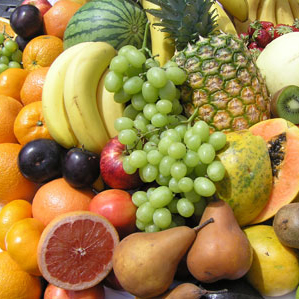
I do not, nor have I ever, recommended a diet exclusively made up of fruit. This is because everyone I have ever met who attempts to sustain him or herself exclusively on fruit for an extended time runs into serious health challenges. Those who attempt to live on just one fruit, such as watermelon, oranges, or tomatoes, run into similar health challenges, but more rapidly than those who vary their fruits. I have seen people irrevocably lose their health in this fashion, and I have seen people die by clinging to this premise of eating only fruit.
Fruit can be defined several ways. Culinary experts define fruit according to the way a food is used in the kitchen. Hence, for them, a pineapple is a fruit. Botanists use more technical methods of classifying foods, and for them a pineapple is a vegetable, but the tomato is a fruit. Some in the health movement have taken the liberty of defining nuts and seeds as fruit, and I have even met a few folks who refer to vegetables such as celery as fruits. I tend to use the culinary definition. Technicalities aside, we have three types of fruit to contend with.
- Sweet fruits run the gamut from melons to dried fruit. They all taste sweet and tend to fall into four (not distinctly defined) groups: melons, subacid, acid, and sweet. These are the fruits typically referred to when someone speaks of eating fruit.
- Vegetable fruits include tomatoes, okra, peppers, cucumbers, squash, and eggplant (aubergine). Botanically, these foods are all fruits, as the seeds are inside. They do not provide the simple carbohydrates that sweet fruits do; hence we have difficulty accessing sufficient calories from eating them.
- Fatty fruits are true fruits, but they provide more fat than most fruits (all fruits provide some fat). Avocados, olives, and to a lesser extent durian, are examples of fatty fruits. (The first two average three-quarters or more fat, and durian is about one-quarter fat, measuring by calories.)
Fruits come closer to meeting our nutritional needs, on every level, than any other group of foods. However, if you try to eat only fruit for months or years at a stretch, you run the risk of gradually running low on certain vital nutrients, primarily minerals. This is particularly true for active people and those who live in warm climates.
These minerals are best provided via the consumption of tender green leafy vegetables. I recommend that people consume about 1 to 3% of their total calories in the form on greens. For most men, that equates to almost a pound of greens per day, on average, less for an average woman.
Often, a person will embark upon an all-fruit program and feel quite well. Their mistake is making a long-term decision based upon a short-term experiment. We would expect anyone who reduces the fat content of their diet by eating more fruit to feel better initially. High carbohydrates and low fat in the diet suits us extremely well. However, undermineralization takes a subsequent toll on their health. When health problems finally do hit overzealous frutarians, they often respond to the problem by eating more fruit. Picture a man in a lifeboat who has succumbed to drinking seawater. After drinking the seawater, he will get even thirstier. Drinking even more seawater will only exacerbate the problem.
Consuming young tender greens does not have to be a daily part of one’s lifestyle. When plain lettuce or celery sounds and tastes appealing, you can be sure that you are ready for some greens. Many people find that after eating fruit for a few days or weeks that greens are really a welcome treat.
It is important for me to stress that health is not created by, nor does it hinge exclusively upon, the consumption of healthy food. Health requires a full-spectrum approach, and one’s health can only be as good as your weakest lifestyle link.
A varied diet of fruits, vegetables, and a moderate amount of nuts and seeds tends to result in the best of health and nutrition. Whole, fresh, ripe, raw, organic plants are the most healthful for us. While simplicity at mealtime usually provides the conditions required for ideal digestion, variety in the diet over time yields optimum nutrition.
Optimum health also cannot be achieved without including a daily fitness program. We are designed to be fit, and without fitness activities our consumption of foods must be minimized. Hence, nutrition is compromised. The rhythmic motion of many fitness activities enhances the peristaltic action of the intestines, helping to move food along for optimum digestion.
In closing, I would strongly recommend against the 100% fruitarian experiment. I do believe that eating the fruit of the season is a good program. In mango season, for example, mangos predominate heavily in my diet. In persimmon season, I will make many a meal of just persimmon. Some days I eat fruit only, for sure. Overall, however, I eat about a pound of greens per day, and recommend that young tender greens, or shoots, comprise about 2% of your total caloric intake.

